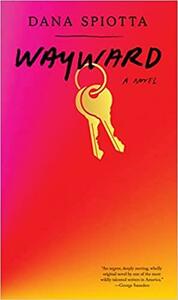Take a photo of a barcode or cover
reflective
medium-paced
Plot or Character Driven:
Character
Strong character development:
Yes
Loveable characters:
Complicated
Diverse cast of characters:
No
Flaws of characters a main focus:
Complicated
Loved this book, could relate to so much of what the protagonist is going through. Could be a book of “our time” with contemporary themes on motherhood, leaning in/out, suburban entitlement, sandwich generation, ie caring for parents and teenagers, etc. Current book club selection, will make for a lively discussion.
Hm. Not quite sure what to say about this one. The premise was definitely up my alley (middle aged woman finds a cute old house, buys it on impulse and realizes it means she needs to change her life), and I found it an easy read. But almost nothing else in the story rang true or held together for me. I didn't sympathize with the main character, found the portrayals of her husband and several friends pretty superficial, unrealistic, and unsatisfying, and the latter third or so of the book was full of odd occurrences and diversions that just kind of came out of left field and didn't really add anything to the overall story as much as they simply filled the last 50 pages or so. Just felt weird when all was said and done.
emotional
hopeful
reflective
slow-paced
dark
emotional
funny
inspiring
sad
slow-paced
Plot or Character Driven:
A mix
Strong character development:
Yes
Loveable characters:
No
Diverse cast of characters:
Yes
Flaws of characters a main focus:
Complicated
slow-paced
Plot or Character Driven:
Character
Strong character development:
No
Loveable characters:
No
Diverse cast of characters:
No
Flaws of characters a main focus:
Yes
“Wayward” by Dana Spiotta
Middle-aged mother Sam is having a mid-life crisis, characterized by buying an old house on a whim, leaving her husband, and working to discover more of who she is with a new group of social justice warrior girl friends. Meanwhile, her daughter Ali is going through a similar crisis at the age of 16, her story not in parallel to Sam’s but meaningfully juxtaposed. On the whole, I wish I had more redeeming to say about this read. Although Spiotta has an interesting voice and I appreciate the way this story features the mid-life crisis of a woman in the way men’s stories get featured all the time, I can’t help but feel there was nothing bringing me back for more. Neither Sam nor Ali as the primary characters face any real stakes. Even as Sam moves out on her own, her ex keeps giving her money, negating the financial challenges she would encounter as a newly single woman. There were so many strands of ideas going every which way, it was hard to figure out what tied it all together; the title offers a hint but a novel on such a broad theme feels unfocused. The shooting of a young man of color became a prop for Sam’s narrative and eventual resolution, but was never actually resolved or explored in the way it deserved. The tipping point for me was the presence of a grooming, predatory relationship that is acknowledged by both mother and daughter, but never bears out in any meaningful way. It was as if Spiotta was saying “This is just a mistake Ali is making; it’s all part of growing up” without any critical consideration of the power dynamics at play. In short, this book had promise to be so much more, but it lands as haphazard, weightless, and uncritical.
It’s always possible I’m missing something as an individual reader. However, my gut reaction to this book: pass on this one. There’s more meaningful narratives featuring women and girls out there with a more critical voice on the issues faced by the marginalized
Graphic: Adult/minor relationship, Gun violence, Police brutality
Moderate: Violence, Blood
challenging
reflective
medium-paced
Plot or Character Driven:
Character
Strong character development:
Complicated
Loveable characters:
Complicated
Diverse cast of characters:
No
Flaws of characters a main focus:
Yes
Wayward felt like a snapshot of 2016 that I didn't want to return to. Going back to those post-Trump election days gave me anxiety. The story of well-meaning white women navigating the US, it poked at a lot of uncomfortable points for me - who I am and who I will be as a white woman, complicated mother/daughter relationships, etc. Lily's home felt like a respite for me, as it was for Sam and Ally. While this wasn't an entirely enjoyable read for me, I think it's one that I will be thinking about for a long time.
Wow, was this disappointing. And depressing. In a bad way, if you know what I mean.
I liked the first 15-20%, after which it became a cringey dumpster fire.
The writing is objectively good; it’s the subjective liking-it part I struggled with.
What’s the actual point? To try to make the reader feel as angry and powerless as the middle-aged white women? Or to feel like they don’t really deserve (?) their road rage and parking lot revenge and little clubs because they’re privileged? Is that the question? I just felt like it was all weird and we were making fun of all of them.
This had a meandering plot strung along by annoying people I didn’t care about. Were we supposed to especially dislike the main character? Magnify the lens on a random, whiny, self-centered woman for what? Because she’s supposed to be Every Woman, because she’s TRYING, because none of us are doing any better? That’s one effed up pep talk.
I did appreciate getting the daughter’s perspective; we saw how she was able to discern for herself that this “relationship” she had needed to end, to objectively assess his angle and come to her own conclusions.
However. It was also gross and I don’t know why the mother is written as this somewhat clueless, suffocating, serial overreacting meddler who suddenly decides that her moment to let go is when she sees her daughter with THIS GUY?! That’s not character growth, it’s dissonance. (Yeah, we know the daughter is figuring things out on her own—AFTER multiple secret statutory sex meetups and nude pics sent—so good for her?) It was gross and sad (daughter) and unbelievable (mother) and stupid (overall). Add to this the annoying fact that half of the daughter’s personality was “I like etymology” which meant we, the readers, had to sit through the author’s tedious demonstration of that unimaginative fact.
Throw in a fine (read: lifeless and irritatingly one-sided because of someone’s irritating neediness) relationship with the main character’s mother and her husband, who she keeps wanting to engage and have sex with and gets an “allowance” from, some peripheral women who turn out to be pointless, a disturbing police-shooting-of-a-Black-child moment cheaply inserted for the sake of the main character’s reflection, fun facts for Syracuse history buffs, all the boxes checked for casually mentioning a wide array of complex sociopolitical issues, and the irritating inclusion of a boring ass pamphlet that I barely read.
Is this meant to reflect the reality of a whole demographic? Are we meant to look through it and feel anything other than the weird, unpleasant sensation that the lens wasn’t worth looking through? It makes me feel kind of deflated and gross at the same time. Hard pass on whatever this book was trying to do.
I liked the first 15-20%, after which it became a cringey dumpster fire.
The writing is objectively good; it’s the subjective liking-it part I struggled with.
What’s the actual point? To try to make the reader feel as angry and powerless as the middle-aged white women? Or to feel like they don’t really deserve (?) their road rage and parking lot revenge and little clubs because they’re privileged? Is that the question? I just felt like it was all weird and we were making fun of all of them.
This had a meandering plot strung along by annoying people I didn’t care about. Were we supposed to especially dislike the main character? Magnify the lens on a random, whiny, self-centered woman for what? Because she’s supposed to be Every Woman, because she’s TRYING, because none of us are doing any better? That’s one effed up pep talk.
I did appreciate getting the daughter’s perspective; we saw how she was able to discern for herself that this “relationship” she had needed to end, to objectively assess his angle and come to her own conclusions.
However. It was also gross and I don’t know why the mother is written as this somewhat clueless, suffocating, serial overreacting meddler who suddenly decides that her moment to let go is when she sees her daughter with THIS GUY?! That’s not character growth, it’s dissonance. (Yeah, we know the daughter is figuring things out on her own—AFTER multiple secret statutory sex meetups and nude pics sent—so good for her?) It was gross and sad (daughter) and unbelievable (mother) and stupid (overall). Add to this the annoying fact that half of the daughter’s personality was “I like etymology” which meant we, the readers, had to sit through the author’s tedious demonstration of that unimaginative fact.
Throw in a fine (read: lifeless and irritatingly one-sided because of someone’s irritating neediness) relationship with the main character’s mother and her husband, who she keeps wanting to engage and have sex with and gets an “allowance” from, some peripheral women who turn out to be pointless, a disturbing police-shooting-of-a-Black-child moment cheaply inserted for the sake of the main character’s reflection, fun facts for Syracuse history buffs, all the boxes checked for casually mentioning a wide array of complex sociopolitical issues, and the irritating inclusion of a boring ass pamphlet that I barely read.
Is this meant to reflect the reality of a whole demographic? Are we meant to look through it and feel anything other than the weird, unpleasant sensation that the lens wasn’t worth looking through? It makes me feel kind of deflated and gross at the same time. Hard pass on whatever this book was trying to do.
DNF. 17%. Tries really hard to be smart and funny but the harder she tries, the more annoying and stupid it is.




